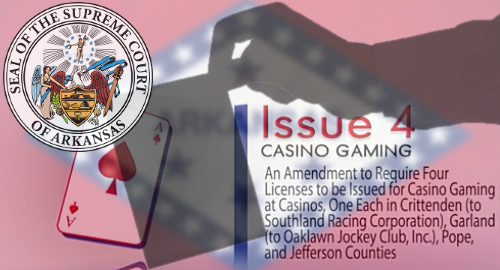 Arkansas voters will have their say on whether to legalize casino gambling in the state, after the state’s highest court struck down a pair of legal challenges by casino opponents.
Arkansas voters will have their say on whether to legalize casino gambling in the state, after the state’s highest court struck down a pair of legal challenges by casino opponents.
On Thursday, the Arkansas Supreme Court dismissed two lawsuits seeking to block the casino question on this November’s election ballot. The question, known as Issue 4, asks voters whether they want to amend the state constitution to okay two new casinos and expand gaming options at two existing racetrack casinos.
Issue 4 was installed on the ballot following a petition drive by Driving Arkansas Forward (DAF), a lobby group funded by two Oklahoma tribal groups, the Quapaw tribe’s Downstream Development Authority and the Cherokee Nation Businesses LLC.
Issue 4 was challenged by Ensuring Arkansas’ Future, a rival lobby group consisting largely of faith-based groups who claimed the question’s wording was ambiguous and forced voters to “speculate” on what voting ‘yes’ would mean for the state.
Citizens for Local Choice, a group consisting of residents of the four Arkansas counties that would be directly affected by a ‘yes’ vote, filed its own challenge of Issue 4. This suit charged that the ballot title and popular name of the proposed amendment didn’t sufficiently describe the details of the gaming changes.
On Thursday, the Supreme Court dismissed both suits, saying previous cases had established that a ballot title “does not need to include every possible consequence or impact of a proposed measure,” and that the ballot title “sufficiently informs the public of the amendment’s purpose and scope and its consequences.” The Court similarly ruled that Issue 4’s wording was sufficiently plain to ensure voters could make intelligent and informed decisions.
Understandably, corks were popping down at DAF headquarters, where counsel Nate Steel issued a statement thanking the Court and predicting that Arkansas voters would “vote to keep casino entertainment dollars in our state when they cast their ballots on November 6.”
As written, Issue 4 could also open up the state for legal sports betting at the four gaming venues by redefining ‘casino gaming’ to include wagering. A similar sports betting provision was responsible for the Arkansas Supreme Court striking down the last attempt at a casino ballot question in 2016, prior to the US Supreme Court’s dismantling of the federal betting ban this spring.